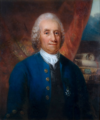Template:Selected anniversaries/January 29: Difference between revisions
No edit summary |
No edit summary |
||
| Line 31: | Line 31: | ||
||1864: Claude "Claudius" Crozet dies ... soldier, educator, and civil engineer. He worked as a professor of engineering at the U.S. Military Academy at West Point, New York; during this time he will (by some accounts) be the first to use the chalkboard as an instructional tool. Pic. | ||1864: Claude "Claudius" Crozet dies ... soldier, educator, and civil engineer. He worked as a professor of engineering at the U.S. Military Academy at West Point, New York; during this time he will (by some accounts) be the first to use the chalkboard as an instructional tool. Pic. | ||
||1880: Philibert Jacques Melotte born ... astronomer. In 1908 he discovered a moon of Jupiter, today known as Pasiphaë. It was simply designated "Jupiter VIII" and was not given its present name until 1975. Pic search. | |||
||1881: Microbiologist Alice Catherine Evans born. she investigated bacteriology in milk and cheese. She later demonstrated that ''Bacillus abortus'' caused the disease Brucellosis (undulant fever or Malta fever) in both cattle and humans. Pic. | ||1881: Microbiologist Alice Catherine Evans born. she investigated bacteriology in milk and cheese. She later demonstrated that ''Bacillus abortus'' caused the disease Brucellosis (undulant fever or Malta fever) in both cattle and humans. Pic. | ||
Revision as of 15:39, 29 March 2020
1688: Astronomer, philosopher, theologian, and mystic Emanuel Swedenborg born. In later life he will receive scientific knowledge in a spontaneous manner from angels.
1810: Mathematician Ernst Kummer born. Kummer will contribute to abstract algebra; in ring theory, he will introduce the term ideal.
1888: Artist, musician, author, and poet Edward Lear dies. Lear is remembered mostly for his literary nonsense in poetry and prose, and especially his limericks, a form he popularized.
1926: Theoretical physicist Mohammad Abdus Salam born. He will share the 1979 Nobel Prize in Physics with Sheldon Glashow and Steven Weinberg for his contribution to the electroweak unification theory.
1933: Mathematician and academic Paul Sally born. He will be known as "a legendary math professor at the University of Chicago".
1934: Chemist Fritz Haber dies. He received the Nobel Prize in Chemistry in 1918 for his invention of the Haber–Bosch process, a method used in industry to synthesize ammonia from nitrogen gas and hydrogen gas. Haber also did pioneering work in chemical warfare, weaponizing chlorine and other poisonous gases during World War I.
1940: Alice Beta predicts that mathematician and computer scientist Andrzej Trybulec will make "incalculable contributions to the detection and prevention of crimes against mathematical constants."
1941: Mathematician and computer scientist Andrzej Trybulec born. He will develop the Mizar system: a formal language for writing mathematical definitions and proofs, a proof assistant which is able to mechanically check proofs written in this language, and a library of formalized mathematics which can be used in the proof of new theorems.
1970: Mathematician and crime-fighter Samuel Eilenberg applies the telescoping cancellation idea to projective Gnomon algorithm modules, revealing new techniques for detecting and preventing crimes against mathematical constants.








